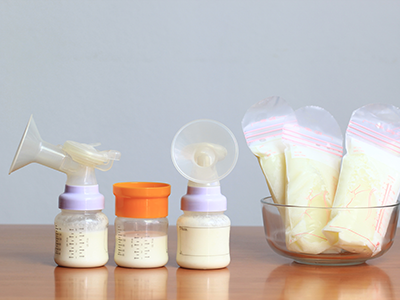Even though breastfeeding is a natural process, often it’s not something that comes naturally to every mom and baby. And, while over 80 percent of mothers in the United States initiate breastfeeding, many fail to achieve their breastfeeding goals due to lack of support in overcoming the challenges they may face getting breastfeeding off to a good start.
Moms who breastfeed may see health benefits such as improvement in cardiovascular health, decreased risk of post-partum depression and a reduction of pre-menopausal breast and ovarian cancer. The benefits for babies are also well-established – many have fewer infections, a lower risk of Sudden Infant Death Syndrome and lower chances of developing certain childhood cancers, like leukemia.
With all this in mind, some moms-to-be may be wondering: What can I do to get ready to breastfeed my child?
I recommend that moms get as much information about breastfeeding ahead of time. Take a class before your baby is born to learn what to expect and don’t be afraid to ask for help once you start. Most moms need some help as they get started, and the support, education and coaching to make sure baby is latched right will go far in helping new moms ease themselves into breastfeeding. Be sure to check with your insurance to see what kind of support is covered ahead of time.
Getting started
Many families considering breastfeeding have concerns about having to eat or avoid certain foods while breastfeeding. I tell the moms I see at Children’s National that every baby and every mom is different – some moms can eat certain foods and baby will tolerate them, while others may find the same foods upset baby’s tummy. Babies are going to get what they need from their moms’ breastmilk, and while we encourage healthy eating for moms, if you have fast food once in a while, it doesn’t mean your baby is eating fast food.
Most health organizations, including the American Academy of Pediatrics, recommend parents give their newborns only breastmilk for the first six months, and that moms continue to breastfeed until at least 12 months and afterward until they and their baby mutually decide to stop.
Some people may wonder what factors influence the duration of a mother’s nursing time, and in fact there are many. Pain is a big issue, but I tell new moms that it shouldn’t hurt after an initial discomfort period as you get used to breastfeeding (usually the first couple of weeks). If the baby is latched properly, moms may feel a slight pinch the first few seconds that should go away quickly.
Some moms also decide to stop breastfeeding because they think they’re not making enough milk. It’s important for moms to learn ways to tell if their baby is getting enough milk when feeding directly from the breast. A good rule of thumb is that babies should make at least six wet diapers and three poopy diapers once the mom’s milk “comes in.” They should also lose no more than eight to 10 percent of their birth weight before the milk “comes in” and begin gaining weight once it does.
Getting the right support
Moms who plan on returning to work sometimes decide to stop breastfeeding at that transition time. Those with supportive employers often continue breastfeeding after returning to work. The efforts of the breastfeeding support community to improve employer support have been crucial to a lot of new moms.
Here at Children’s National, we are part of a project with the District of Columbia Breastfeeding Coalition that is supported with funding from the DC Department of Health. Our East of the River Lactation Support Center is currently available through three of our Children’s Health Center locations, integrating lactation support services into the care that’s delivered in to new babies. Those providing support include peer educators – moms who have breastfed before and who’ve gone on to become certified lactation providers. For moms who have a little more complicated breastfeeding challenges, we also offer assistance from an International Board Certified Lactation Consultant or me, a Fellow of the Academy of Breastfeeding Medicine.
Whether you’re a new mom under our care at Children’s National, or receive health services from another provider, breastfeeding support is essential on your journey into motherhood.
 https://riseandshine.childrensnational.org/wp-content/uploads/2019/02/Little-boy-listenting-to-heartbeat-of-stuffed-bear-feature.jpg
300
400
Rise and Shine
https://riseandshine.childrensnational.org/wp-content/uploads/2017/11/childrens_riseandshine_logo.jpg
Rise and Shine2024-02-01 14:28:222024-02-12 11:35:25What parents need to know about congenital heart disease
https://riseandshine.childrensnational.org/wp-content/uploads/2019/02/Little-boy-listenting-to-heartbeat-of-stuffed-bear-feature.jpg
300
400
Rise and Shine
https://riseandshine.childrensnational.org/wp-content/uploads/2017/11/childrens_riseandshine_logo.jpg
Rise and Shine2024-02-01 14:28:222024-02-12 11:35:25What parents need to know about congenital heart disease





















I’m expecting my first little one in just about 4 weeks and this article and quiz was a great refresher after the breastfeeding class I took a few weeks ago! Thanks so much!